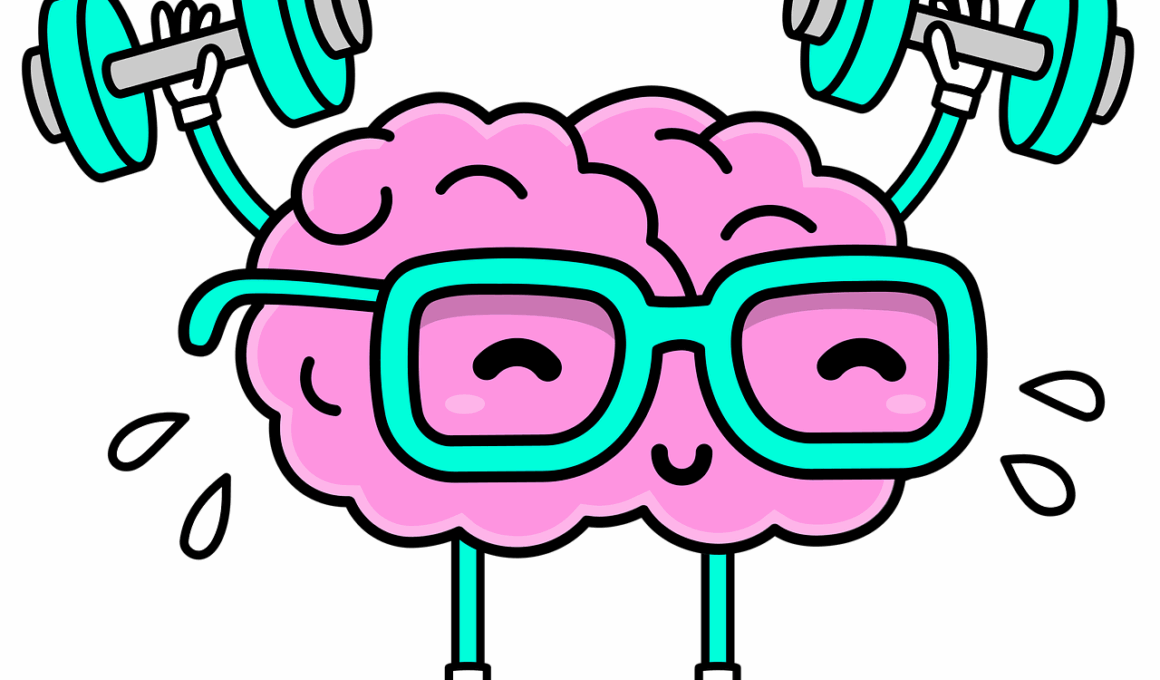Nutrition Strategies to Enhance Mental Focus During Training
Nutrition plays a crucial role in enhancing mental focus during training and workout sessions. One of the most effective strategies is to incorporate complex carbohydrates into your diet. Foods such as whole grains, oats, and legumes are packed with nutrients that provide a slow release of energy. This steady supply helps maintain energy levels throughout your workout, preventing mental fatigue. Additionally, considering the richness of antioxidants found in fruits and vegetables can protect your brain from oxidative stress. Berries, spinach, and nuts should be staples in your diet. A well-rounded diet supports brain function and cognitive performance. Don’t forget about hydration; drinking enough water is essential. Dehydration can lead to diminished focus and cognitive skills, negatively impacting your training outcomes. Timing your meals also matters—consider eating a balanced meal two to three hours before your training session. This allows for optimal digestion and energy utilization. If you train early, a combination of protein and carbs should be consumed beforehand. Experimenting with nutrition plans can help identify what works best for your individual requirements, so consider tracking your food intake for better results.
Another powerful strategy for improving mental focus is through the inclusion of healthy fats in your diet. Foods such as avocados, olive oil, and fatty fish like salmon are rich in omega-3 fatty acids, which are essential for brain health. These fats not only boost cognitive functions but also promote neuroplasticity, the ability of your brain to adapt and grow new connections. Including these fats in your diet can improve concentration and mental clarity. Furthermore, protein intake is equally important. Lean meats, eggs, and dairy products are excellent sources of high-quality protein that help repair tissues and support muscle growth. Protein can also contribute to the release of neurotransmitters, which are vital for mood regulation and focus. It is advisable to incorporate protein-rich snacks throughout the day. Consider including snacks such as Greek yogurt, cottage cheese, or protein bars in your routine. These options can maintain energy levels and mental alertness. Keep in mind that balancing these macronutrients is key; a diet overly rich in any one category may hinder performance. Strive to create meals that maintain a macro balance for optimal training benefits.
Maintain Your Blood Sugar Levels
Stabilizing your blood sugar levels is another vital component of enhancing mental focus during workouts. Fluctuations in blood sugar can lead to mood swings, irritability, and reduced cognitive function. One effective way to manage blood sugar levels is to choose low-glycemic index foods such as whole grains, legumes, and most fruits. These foods release glucose slowly into the bloodstream, providing sustained energy without spikes. On the other hand, high-glycemic foods, found in sugary drinks and white bread, can result in quick bursts of energy followed by crashes. It’s especially important to steer clear of these during training times. Another practical tip is to include fiber in your meals, which benefits both digestive health and blood sugar control. Foods like beans, vegetables, and whole grains are high in fiber, helping to slow down digestion further and keep energy levels stable. Consider meal prepping snacks that combine protein, healthy fats, and carbs for the best effect. Snacking on these balanced options during training breaks can significantly aid in maintaining focus until your workout concludes.
Hydration isn’t just one aspect of nutrition; it plays an essential role in cognitive function as well. During intense training sessions, losing fluids can negatively affect your focus and physical performance. It becomes crucial, therefore, to drink adequate amounts of water before, during, and after workouts. Aim for clear fluids without added sugars for optimal hydration—infused waters with citrus or herbs offer great taste too. Moreover, recognizing the signs of dehydration may help improve your focus. Common symptoms include headaches, fatigue, and lack of concentration. Monitoring your urine color can also be a quick way to assess hydration levels; pale yellow indicates good hydration, while dark yellow signals dehydration. If you’re engaging in prolonged training, consider electrolyte-rich drinks to balance electrolyte levels, especially in hot climates. This will help prevent fatigue and boons recovery. Additionally, proper mineral intake, such as potassium and magnesium, can counteract cramping for athletes. Keeping a water bottle handy throughout the day is a simple way to promote better hydration habits and maintain focus during workouts.
Supplementing for Improved Focus
Incorporating nutritional supplements can provide an edge when it comes to enhancing mental focus during training sessions. Several supplements are designed to improve mental performance safely. Omega-3 fatty acids, as mentioned earlier, can also be taken in supplement form to support cognitive function. In addition to this, vitamins such as B-complex vitamins play an essential role in energy production and brain health, encouraging cognitive efficiency and stability. Creatine is another supplement that is not only beneficial for muscle performance but may enhance memory and reasoning skills, making it an excellent option for athletes looking to boost their mental capacity. Before starting any supplement routine, it’s crucial to consult healthcare professionals for personalized advice based on individual needs. Though supplements can be helpful, they should not replace whole foods but rather complement a well-rounded diet. The importance of whole foods cannot be overstated—they provide an array of nutrients that work synergistically for optimum performance. Knowledgeable choices about which supplements best support your training goals can guide effective enhancement strategies.
Another concept is the timing of nutrition around training. The nutrients you consume before and after workouts can significantly impact mental focus and recovery. Pre-workout meals high in carbohydrates and moderate in protein can fuel your body effectively for exercise. Ideally, plan for complex carbohydrates, which help maintain energy levels and focus. Post-workout nutrition is equally important; consuming a mix of protein and carbohydrates after training helps replenish glycogen stores and aids in recovery. Options like a protein shake with a banana serve to maximize recovery while supporting muscle repair. Additionally, focusing on meal timing allows for personalization tailored to individual schedules and preferences. Meet with a nutrition coach to determine the best plan that fits your lifestyle. Customization increases adherence to nutrition plans, which ultimately enhances performance. This strategic planning can prevent feelings of fatigue and help athletes maintain their mental edge during rigorous training. Monitoring how different foods impact your energy and focus can lead to valuable insights essential for your growth and progress.
Mindfulness and Nutrition
Incorporating mindfulness techniques can also enhance the effects of nutrition on mental focus during training. Practicing mindfulness encourages a more profound connection between body and mind. Engaging mindfully in your body can enhance your eating habits, allowing for greater appreciation of the nutrients consumed. Benefits arise from being aware of food choices and recognizing how these choices impact overall well-being. This increased awareness can lead to healthier dietary patterns. The practice can extend to training sessions, encouraging you to remain present and aware of your body’s signals. Techniques such as focused breathing and visualization can be incorporated before or during workouts, helping to center attention and enhance focus. Combining proper nutrition and mindfulness creates a holistic approach to enhancing mental focus. Implementing regular mindfulness practices in your daily routine fosters a positive mindset toward approaching each workout. This synergy between physical nutrition and mental well-being can ultimately elevate training experiences to unparalleled levels, enhancing overall growth and development.
Finally, note that individual responses to nutrition can vary significantly. What works as an optimal strategy for one athlete may not always apply to another. Conducting regular assessments of your performance and mental focus regarding meals can help fine-tune your nutrition strategy. Keeping a log of food intake and workouts allows you to identify potential correlations between specific foods and both physical energy and cognitive performance. By adjusting diets based on this feedback, you can hone in on what maximizes mental acuity during training. Online resources and guidance from professionals in sports nutrition can also provide insights tailored to your unique needs based on experiences and case studies. Incorporating variety in your meals, through colors and types of foods, can enhance nutrient profiles and decrease boredom. Assessing food quality over quantity promotes a positive attitude towards nutrition, as excitement around meals is crucial for adherence. Consider setting achievable goals for integrating healthy practices and gradually working toward them. Tracking additional factors such as sleep, stress levels, and hydration can also unveil important insights. Ultimately, balancing nutrition and mental focus will yield rewarding results in training.


